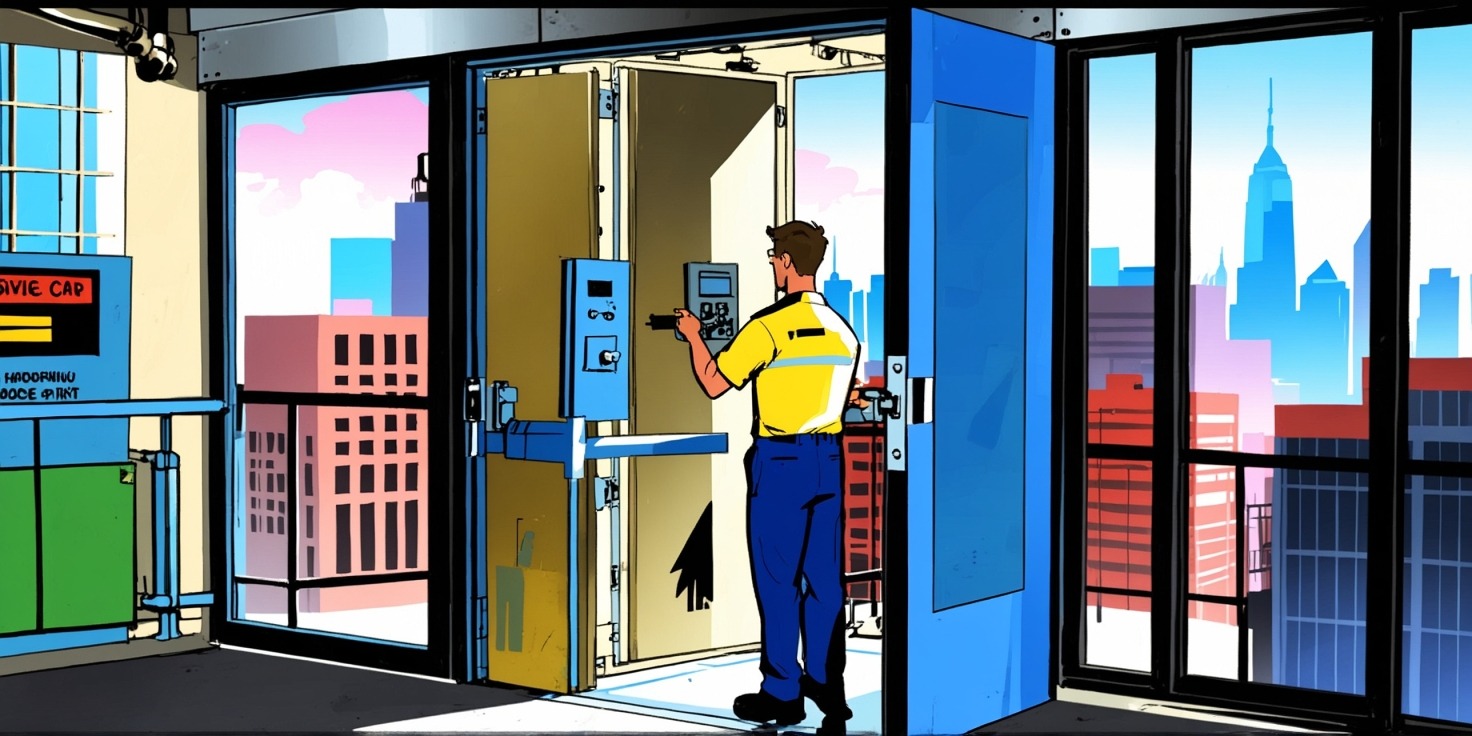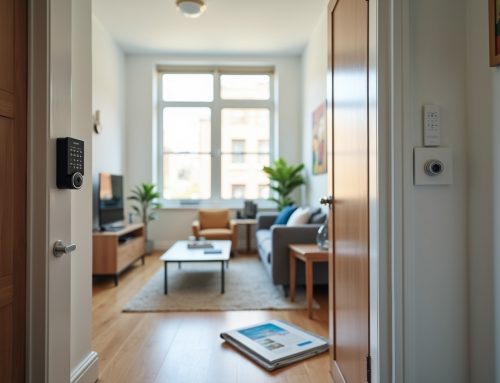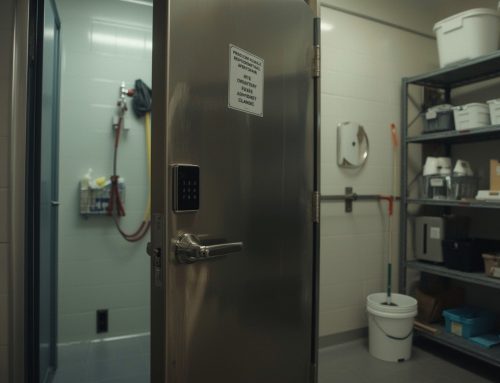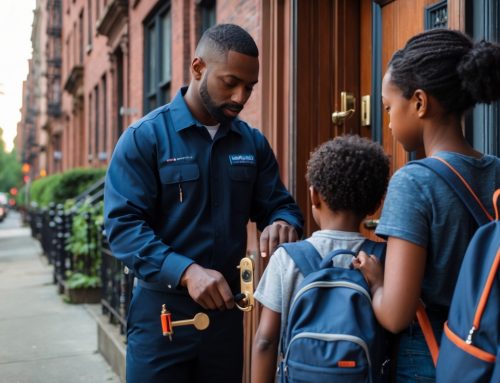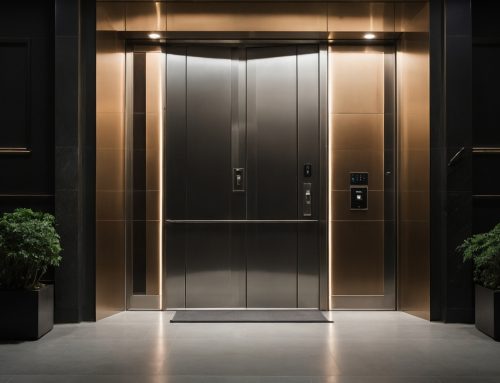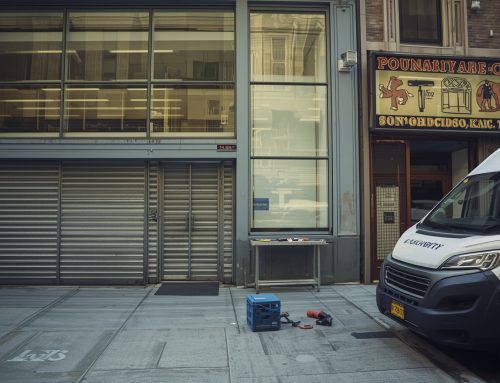Looking for the best locks for NYC rooftop access points? In a city where security is everything, protecting rooftop entryways is no longer optional—it’s essential. At iLocksmiths, we understand the unique challenges of securing New York City buildings. With over 11 years of experience and 24/7 service, we’ve helped thousands of residents and businesses safeguard their properties with high-security solutions.
Mul-T-Lock, Medeco, and Schlage Primus are the top choices for rooftop access in NYC. These locks offer advanced key control, drill resistance, and tamper-proof features. In this article, we’ll break down what makes each of these locks ideal for rooftop security, compare their strengths, and help you choose the right one for your building.
But these aren’t the only options worth considering. Security expert Marc Tobias, author of “Locks, Safes, and Security,” emphasizes the importance of layered protection for rooftop access. So, if you’re serious about securing your building from top to bottom, let’s dive into the best rooftop locks NYC has to offer.
Understanding Rooftop Access Points in NYC
Rooftop access points in New York City buildings serve several essential functions. They allow maintenance crews to service HVAC systems, water tanks, and other rooftop equipment. In emergencies, these access points provide critical exit routes. Additionally, many buildings use rooftops as recreational areas, especially in residential high-rises.
However, these access points present unique security challenges. In a densely populated city like NYC, rooftops can become vulnerable entryways for unauthorized individuals. Poorly secured doors or hatches may lead to break-ins, vandalism, or even safety hazards for residents and staff. Buildings with shared access or adjacent rooftops face even greater risks.
To address these concerns, NYC enforces strict building codes and safety regulations. Property owners must ensure rooftop doors are secure, self-closing, and often alarmed. Compliance with these rules is not optional—it’s a legal requirement. Regular inspections and upgrades are necessary to maintain safety standards.
For enhanced protection, property managers often consult a trusted commercial locksmith. They also consider installing advanced security cameras to monitor rooftop activity. These proactive steps help safeguard both property and people in high-rise urban environments.
Why Rooftop Security Matters in Urban Settings
In dense urban environments like New York City, unsecured rooftops pose serious threats. Intruders often exploit these access points to bypass main entry systems. Once inside, they can commit theft, vandalism, or even sabotage building infrastructure. Property owners may also face legal consequences if someone is injured due to poor rooftop security.
In 2022, a man accessed a Manhattan apartment complex through an unlocked rooftop door. He vandalized HVAC units and caused thousands in damages. Another incident in Brooklyn involved burglars entering through a rooftop hatch, stealing electronics from multiple units. These breaches highlight how rooftops can become gateways for crime.
Rooftop access is often overlooked in security planning. Yet, it remains one of the most vulnerable points in any building. Without proper locks or surveillance, it invites unauthorized entry. To prevent such risks, property managers should consult a trusted commercial locksmith for tailored rooftop solutions.
Additionally, installing security cameras near rooftop doors can deter intruders and provide crucial evidence if an incident occurs. Proactive measures today can prevent costly consequences tomorrow.
Types of Locks Suitable for Rooftop Access Points
Deadbolt locks offer solid protection and are ideal for rooftop doors with heavy frames. They resist forced entry well but lack remote access features. Padlocks, especially weatherproof models, are cost-effective and easy to install. However, they can be vulnerable to bolt cutters if not high-grade. Electronic keypad locks provide keyless convenience and controlled access. They perform well in harsh weather but require battery maintenance.
Smart locks bring advanced security with remote control and real-time alerts. While convenient, they depend on Wi-Fi and power, which may be unreliable outdoors. High-security cylinder locks are built to resist picking, drilling, and bumping. Their robust design suits rooftop hatches exposed to extreme conditions.
When choosing a lock, consider exposure to rain, snow, and temperature shifts. Durability and tamper resistance are crucial for elevated, less-visible entry points. For professional installation, explore our residential locksmith services. If you need help selecting the right lock, contact our team through the contact page.
Key Features to Look for in Rooftop Locks
Durable rooftop locks must withstand harsh weather. Choose models made from weatherproof and corrosion-resistant materials to prevent rust and wear. These locks maintain integrity through rain, snow, and extreme temperatures. For maximum protection, opt for locks with ANSI/BHMA Grade 1 ratings. This ensures top-tier resistance against forced entry and tampering.
Key control is another critical factor. Locks with restricted keyways prevent unauthorized duplication, reducing the risk of internal breaches. Electronic locks offer even more control. Features like audit trails and access logs track every entry and exit. This data helps identify suspicious activity and strengthens accountability.
Additionally, seamless integration with existing building security systems enhances overall safety. It allows centralized monitoring and real-time alerts. This is especially vital for high-traffic or sensitive rooftop areas.
When securing rooftop access, don’t compromise. Invest in locks that combine strength, control, and smart technology. For expert installation, trust a professional commercial locksmith. If you’re in Brooklyn, explore our Park Slope service area for fast, reliable support.
Top Lock Brands and Models for Rooftop Access
When it comes to rooftop access security, a few lock brands consistently lead the industry. Medeco’s Maxum Deadbolt offers drill-resistant cylinders and hardened steel inserts, ideal for high-risk areas. Mul-T-Lock’s Hercular Deadbolt features a telescopic pin tumbler system, making it nearly impossible to pick. Abloy’s Protec2 stands out with its rotating disc mechanism, perfect for extreme weather conditions.
Schlage’s B660P model delivers commercial-grade strength and is easy to integrate with access control systems. Yale’s Assure Lock SL combines keyless convenience with robust construction, suitable for both residential and commercial rooftops. Each model balances durability, tamper resistance, and ease of use.
For property owners in NYC, choosing the right lock is crucial. Consider consulting a commercial locksmith to ensure proper installation and compliance with local codes. You can also explore our Park Slope service area for fast, expert support.
| Brand | Model | Security Level | Price Range | Best Use Case |
|———–|——————|—————-|————-|————————|
| Medeco | Maxum Deadbolt | High | $$$ | Commercial rooftops |
| Mul-T-Lock| Hercular Deadbolt| Very High | $$$$ | High-security zones |
| Abloy | Protec2 | Extreme | $$$$ | Harsh environments |
| Schlage | B660P | Medium-High | $$ | Access control systems |
| Yale | Assure Lock SL | Medium | $$ | Smart rooftop access |
Installation Considerations and Best Practices
Hiring a professional locksmith ensures rooftop locks are installed securely and function correctly. Improper installation can leave access points vulnerable. Always evaluate the type of door or hatch before selecting a lock. Steel doors may require different hardware than wooden or aluminum ones. Reinforce weak frames and hinges with heavy-duty materials to resist forced entry. Use tamper-proof screws and high-grade strike plates for added strength.
Routine maintenance is essential for long-term security. Schedule inspections at least twice a year to check for wear, rust, or misalignment. Lubricate moving parts to prevent jamming, especially in extreme weather. Replace any damaged components immediately to maintain optimal performance.
Consulting a commercial locksmith can help identify vulnerabilities and recommend the best locking systems. For residential buildings, a residential locksmith service can provide tailored solutions. Don’t overlook the importance of compliance with local building codes and fire safety regulations. These factors influence both the type of lock and its placement. Proper planning and expert installation significantly reduce the risk of unauthorized entry.
Legal and Compliance Factors in NYC
Rooftop access in New York City must comply with strict building and fire safety codes. The NYC Building Code mandates that rooftop doors remain secured yet accessible during emergencies. According to the FDNY, any locking mechanism must allow for immediate egress without keys or tools. This ensures occupants can exit safely during a fire or other emergency.
Balancing security and safety is critical. While high-security locks deter unauthorized access, they must not hinder emergency evacuation. Devices like fail-safe electric strikes or panic bars with alarms offer both protection and compliance. These solutions meet code requirements while maintaining rooftop security.
Property owners should consult the NYC Department of Buildings and FDNY guidelines before installing or upgrading locks. Refer to the official NYC DOB site at https://www.nyc.gov/site/buildings/index.page and FDNY regulations at https://www.nyc.gov/site/fdny/index.page for detailed compliance information.
For expert assistance, explore our commercial locksmith services or reach out via our contact page. Our licensed professionals understand local codes and offer tailored rooftop access solutions.
Smart Lock Integration and Remote Access Control
Smart locks offer unmatched convenience for rooftop access in NYC buildings. They allow remote locking and unlocking from any location. Building managers receive real-time alerts for every entry or attempted breach. This ensures quick responses and improved security oversight.
These systems integrate seamlessly with most building management platforms. Mobile apps provide instant control, making access management efficient and user-friendly. Whether you’re on-site or off, you stay connected to your property’s security.
However, digital access comes with cybersecurity risks. To mitigate threats, always use encrypted connections and multi-factor authentication. Regular firmware updates are essential to patch vulnerabilities. Limit user permissions and monitor access logs frequently.
Smart locks also reduce the need for physical keys, lowering the risk of unauthorized duplication. For added protection, pair them with security cameras to monitor rooftop entries in real time. If you’re upgrading your system, consult a trusted commercial locksmith for expert installation and support.
Incorporating smart locks enhances both security and convenience. With the right setup, managing rooftop access becomes streamlined and secure.
Cost Analysis and Budgeting for Rooftop Lock Systems
High-security rooftop locks range from $150 to $600 per unit. Electronic systems with keypads or smart access can exceed $1,000. Installation fees vary, typically between $100 and $300, depending on complexity and building structure. While basic padlocks are cheaper, they offer minimal protection and may require frequent replacement.
Investing in advanced locking systems reduces long-term risks. Smart locks and commercial-grade deadbolts provide better durability and enhanced security. Over time, they lower maintenance costs and deter unauthorized access. Property managers should weigh initial expenses against potential liability and insurance savings.
To stay within budget, prioritize critical access points first. Consider phased upgrades to spread costs over time. Always request quotes from multiple vendors to compare pricing and services. For added value, explore bundled packages that include maintenance or monitoring.
Working with a trusted commercial locksmith ensures proper installation and compliance with NYC codes. For tailored advice, reach out through our contact page. Smart budgeting today can prevent costly security breaches tomorrow.
Frequently Asked Questions (FAQs)
For rooftop doors in NYC, Grade 1 deadbolts offer the highest level of security and durability. Electronic locks can be safe outdoors if they’re weather-rated and properly sealed. Inspect rooftop locks every six months and replace them if signs of wear appear. While DIY installation is possible, hiring a professional locksmith ensures proper fitting and compliance.
NYC building codes may require specific locking mechanisms for rooftop access, especially in multi-unit buildings. To prevent unauthorized key duplication, use restricted key systems or smart locks with encrypted access. Smart locks rated for extreme weather can withstand NYC’s harsh winters and humid summers.
If a rooftop lock fails during an emergency, contact a 24/7 locksmith immediately. Integrating rooftop locks with your building’s security system enhances monitoring and access control. Grade 1 locks are more robust and secure than Grade 2, making them ideal for high-risk rooftop entry points.
Always choose locks that meet ANSI standards and are tested for outdoor use. Regular maintenance and professional guidance help ensure long-term reliability and safety.

